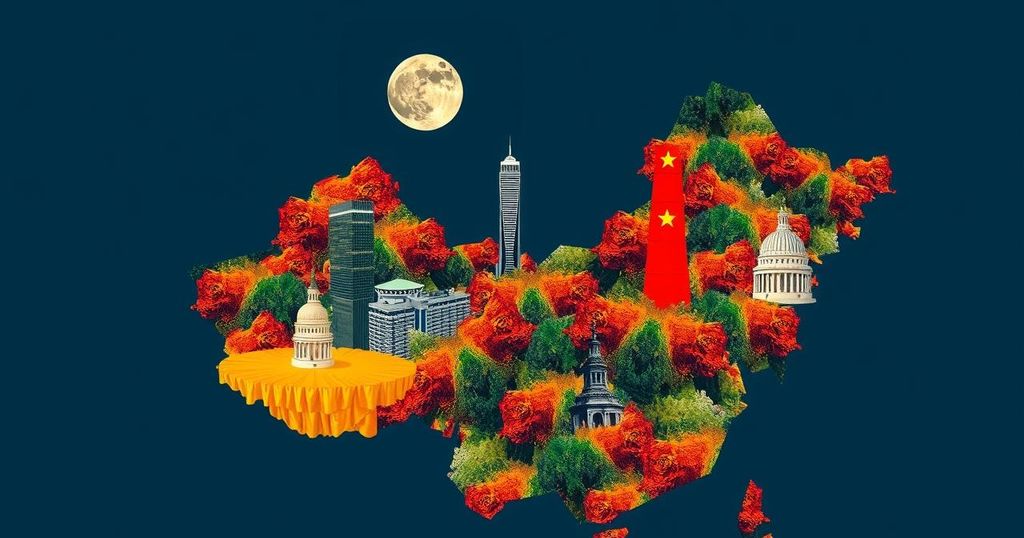Climate change
ASIA, AZERBAIJAN, BAKU, BELINDA SCHAEPE, CENTRE FOR RESEARCH ON ENERGY AND CLEAN AIR, CLIMATE CHANGE, DING XUEXIANG, DONALD TRUMP, ENVIRONMENTAL POLICY, EUROPE, GEOPOLITICS, GERMANY, GREENHOUSE GAS EMISSIONS, JENNIFER MORGAN, NORTH AMERICA, PARIS AGREEMENT, UNITED STATES, WHITE HOUSE
Jamal Walker
0 Comments
China Positions Itself as Climate Leader Amid Trump’s Return
As Donald Trump is set to return to the presidency, China seizes the opportunity to enhance its role in global climate leadership amid a potential U.S. withdrawal from climate diplomacy. During COP29, China has shown a collaborative spirit while resisting calls to be classified as a donor nation. With an emphasis on financing and ambitious emission targets, China’s positioning will influence future climate negotiations, particularly as tensions with the U.S. are expected to rise.
As Donald Trump prepares to resume his presidency, China is positioning itself as a potential leader on climate diplomacy, especially given the anticipated shift in U.S. policy. During the COP29 climate talks in Azerbaijan, China has displayed a more cooperative approach, sharing its international climate finance contributions while resisting pressures to be classified as a donor nation. This strategy marks a distinct change from the previously aggressive stance taken by China in international forums. Historically, the U.S. and China have contributed 41 percent of global greenhouse gas emissions, and with Trump’s skepticism towards climate agreements, experts predict a cooling of the bilateral relationship. Belinda Schaepe from the Centre for Research on Energy and Clean Air in London notes that Trump’s return “opens up an opportunity for China to step up into even more of a climate leadership role,” enabling Beijing to demonstrate its commitment to global responsibilities. While China has indicated its efforts with a reported $24.5 billion in climate finance since 2016, it faces increasing calls to enhance transparency and accountability regarding its contributions to global climate initiatives. Vice Premier Ding Xuexiang emphasized the need for wealthier nations to exceed the $100 billion annual pledge to support climate projects in developing countries, further complicating the dynamics in climate negotiations as developing countries advocate for equity in climate financing. Despite the challenges posed by a Trump presidency that may jeopardize multilateral climate efforts, Li Shuo, director of the China climate hub at the Asia Society Policy Institute, perceives potential advantages in negotiations. He seeks a collaborative environment as “the politics will get worse before they get better,” predicting that a U.S. exit from significant climate accords could lead to more straightforward negotiations, as the U.S. maintains a controversial stance. As climate diplomacy evolves, China’s leadership will be scrutinized closely, particularly regarding its ambitions and actions on domestic and international fronts. The forthcoming Biden administration aims to position the U.S. back into significant climate commitments, introducing further complexity to the global climate narrative.
The article addresses the shifting dynamics of global climate leadership in light of Donald Trump’s anticipated return to the presidency. With China being the largest emitter of greenhouse gases and a rapidly growing force in green energy, it seeks to fill any potential void left by U.S. climate policy under Trump. The discussions at COP29 in Azerbaijan highlight China’s attempts to cooperate with other nations despite its resistance to being labeled a donor country. The background offers insight into how increasing pressure on China to enhance transparency and its notable financial contributions to climate finance are central themes in current negotiations. The relationship between the U.S. and China is pivotal, as they account for a significant percentage of global emissions. With the backdrop of differing Climate positions from Trump and Biden, the stage is set for a complex and potentially confrontational future in international climate negotiations.
In summary, with Donald Trump’s imminent return to power, China’s opportunity to assume a more prominent role in global climate leadership becomes evident. The COP29 discussions underscore China’s commitment to climate diplomacy, despite its reluctance to alter its donor status. As tensions between the U.S. and China are poised to heighten, the future of global climate collaboration appears uncertain, yet China aims to solidify its position as a responsible global power. The evolving landscape will require keen negotiation and adaptation from all parties involved.
Original Source: www.france24.com




Post Comment